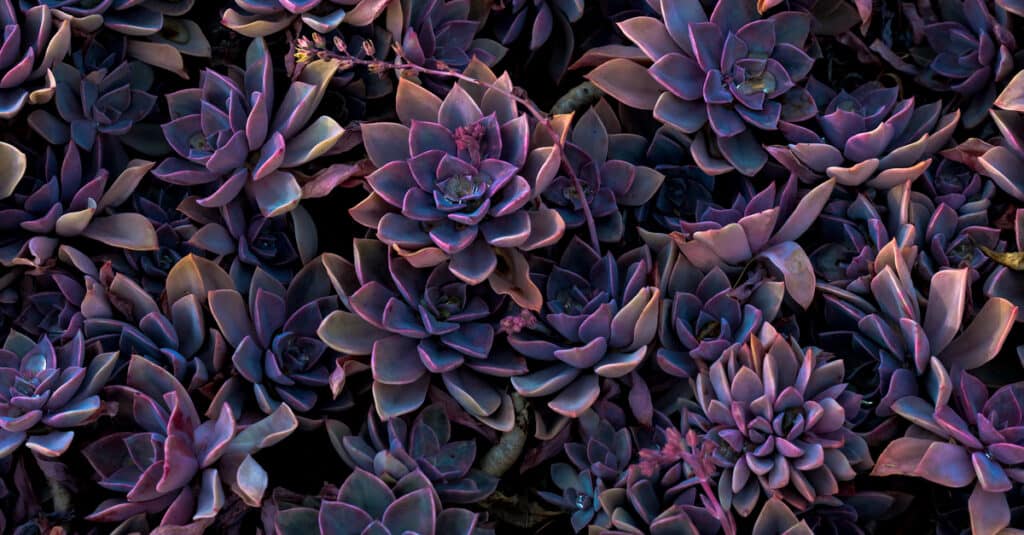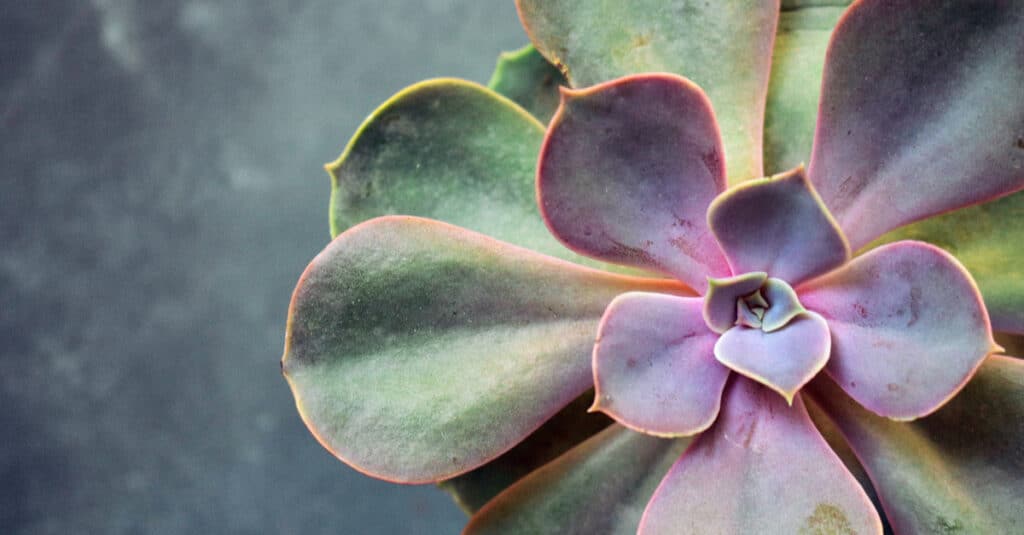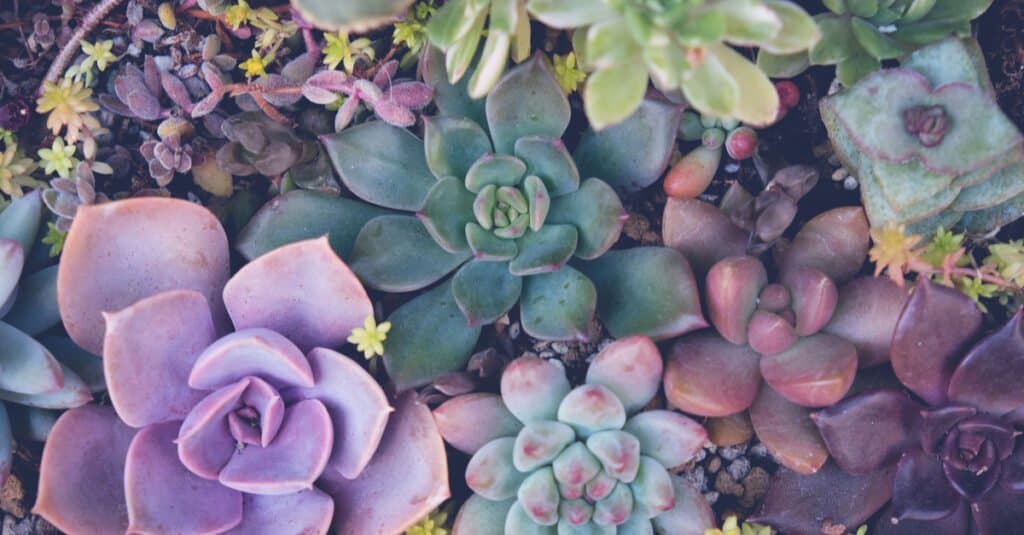Creating a safe environment for both pets and plants can be a challenge. Fortunately, most succulents are entirely safe for animals. Additionally, most animals are naturally wary about eating succulents. Succulents provide a variety of benefits. For example, they are naturally good at eliminating toxins from the air. They also contribute to higher humidity levels, which help alleviate dry skin, colds, and sore throats.
A few exceptions exist, though. Some succulents can be slightly poisonous for dogs or cats if swallowed. For more information on which succulents are toxic and which are not, keep reading!
Are Succulents Poisonous to Dogs or Cats?

Sempervivum, burros tail, Christmas cactus, and zebra Haworthia are safe succulent species.
©Harrison Cole Keithahn/Shutterstock.com
Not all succulent species are toxic for your pets. Succulents are great for pet owners, as most types are perfectly safe for pets. Below are five popular succulents that pose no danger to dogs or cats:
Sempervivum
Sempervivum, sometimes referred to as Hens and Chicks, are succulent perennials that grow in blankets of lovely dense rosettes. They can be used as ornamental grass because they are so easy to propagate. Sempervivum plants are easy-to-grow succulents because they can thrive in both cold and hot conditions, with low or intense light levels.
Burros Tail
Sedum Burrito, or Donkey’s Tail Succulent, is native to Mexico. This is a perennial succulent that can grow in any type of soil with sufficient drainage and is easy to care for. This plant has silver-green leaves that are spherical and fleshy.
Christmas Cactus
The Christmas cactus is also known as the Thanksgiving cactus or the Easter cactus, depending on which holiday it is celebrated. During the holidays, this plant produces stunning red-pink flowers. Nearly any indoor environment benefits from the inclusion of this popular houseplant with winter-flowering blossoms. An excellent choice for holiday gift-giving, Christmas cactus has the added benefit of being both easy to care for and easily multiplied.
Zebra Haworthia
A well-known Haworthia species is Haworthia fasciata, also known as “Zebra Haworthia.” The slender, dark green leaves have white ridges running the length of them, giving them the appearance of zebra stripes. Since it has a striking appearance and requires little care, the Zebra Haworthia is popular as an interior plant. A wide range of offsets can be produced and propagated with ease.
Echeveria
Native to Central America’s semi-desert regions, Echeveria is a rosette-formed succulent family. Beautiful rosettes with exquisite water-storing leaves make echeverias a favorite succulent. Echeveria succulents are available in a wide range of vibrant hues, and they frequently bear showy flowers. They’re low-maintenance, quick-growing, and drought-tolerant.
Toxic Succulents for Pets

Other succulent species like the Jade plant, Aloe vera, and Fiddle Leaf are poisonous to dogs and cats.
©Inthemood/Shutterstock.com
If you have dogs in your home, it’s more crucial to know which succulents to avoid. If dogs or cats eat any of the plants listed below, they may become ill, but it is unlikely that they will become extremely ill. Some of the succulent plants that are toxic to cats and dogs are:
Jade Plant (Crassula ovata)
Succulent houseplants like jade plants, also known as Crassula ovata, are extremely popular. Jade plants can induce effects of poisoning in dogs and cats such as lethargy, incoordination, and a decreased heart rate. Your pets may find their glossy oval leaves and small tree-like appearance irresistible, too.
Aloe Vera
Multiple health benefits for people have made aloe a popular houseplant. However, it is poisonous to cats and dogs because of a compound called aloin, which draws additional water into the intestines of the animal when consumed. Vomiting, diarrhea, fatigue, a loss of appetite, a change in urine color, and tremors are all possible symptoms.
Fiddle Leaf (Philodendron bipennifolium)
Known as the Panda Plant, the Fiddle Leaf Philodendron is a low-maintenance houseplant. However, insoluble calcium oxalates crystal, an irritant to the tissues, is found in all parts of this plant. Mouth discomfort, vomiting, and trouble swallowing are all symptoms of poisoning from the panda plant.
Snake Plant (Sansevieria trifasciata)
Snake Plant is a low-maintenance houseplant that can thrive in a wide range of climates. However, the saponins in the plant can cause moderate poisoning in your dogs or cats, resulting in symptoms such as nausea, vomiting, and diarrhea.
Kalanchoe Species
Flowering plants in the Kalanchoe genus are tropical, succulent, and bloom even in the winter. Taking care of them is simple, and they’re drought-tolerant to boot. However, the cardiac glycosides found in Kalanchoe plants can lead to drowsiness, increased salivation, diarrhea, and abdominal pain in dogs and cats if ingested. Massive quantities of Kalanchoe can lead to irregular heartbeats, an increased heart rate, and labored breathing as well as collapse or even death.
Euphorbia Succulents
Euphorbia Succulents like Enopla, Monstrose, and Corn Cob Cactus are renowned for their lovely blossoms. Despite their beauty, these succulents are hazardous to both humans and animals, as their leaves and stems contain white latex sap that can cause skin and eye irritation when touched. When unintentionally ingested, it can cause mouth and stomach irritability, leading to vomiting.
Senecio Succulents
Despite their popularity, most succulents in the Senecio species are deadly to our four-legged friends. Ingestion of these plants can cause nausea, vomiting, and lethargy. The good news is that Senecios like String of Pearls and String of Hearts can be hung, keeping them out of reach of your pets.
How To Keep Your Pets Safe from Poisonous Succulents

©SewCream/Shutterstock.com
Keep your dogs or cats away from your succulents. If you have pets, don’t buy plants that could be harmful to them. If you do decide to buy such plants, make sure you store them in a place that is difficult for your fur baby to access. After planting any of these toxic plants in your garden, create a barrier to deter your pet. Your veterinarian or an animal poison control center will be able to help if your pet accidentally ingests a poisonous succulent.
What To Do If Your Pet Eats a Succulent
Succulents can be dangerous to pets, so if your dog or cat consumes one, you should immediately identify the plant and contact your veterinarian. A poison control center can help if your veterinarian isn’t experienced with houseplants or succulents.
The photo featured at the top of this post is © SewCream/Shutterstock.com
Thank you for reading! Have some feedback for us? Contact the AZ Animals editorial team.






